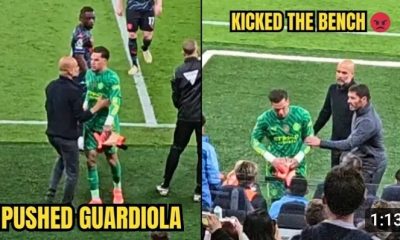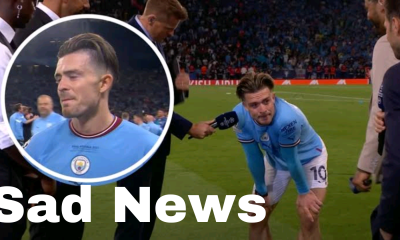Uncategorized
The Possible Resignation of Kenny Atkinson from the Cleveland Cavaliers: An In-Depth Analysis…
The Possible Resignation of Kenny Atkinson from the Cleveland Cavaliers: An In-Depth Analysis
In the world of professional basketball, coaching transitions often capture public attention. While the story of a coach stepping down or requesting resignation may seem simple on the surface, numerous underlying factors contribute to such decisions. If Kenny Atkinson, a well-regarded coach known for his time with the Brooklyn Nets and as an assistant with the Golden State Warriors, were to resign from his position with the Cleveland Cavaliers, there could be various reasons, ranging from personal motivations to professional conflicts.
1. Coaching Career Trajectory and Challenges
Kenny Atkinson has had a diverse coaching career, from assistant roles with the Atlanta Hawks and the New York Knicks to head coach of the Brooklyn Nets. His tenure with the Nets was marked by a focus on player development and fostering a modern, up-tempo style of play. However, despite his successes, Atkinson was let go by the Nets during the 2019-2020 season—coincidentally right before the team added superstar players like Kevin Durant and Kyrie Irving. His departure from Brooklyn was surrounded by discussions about the mismatch between Atkinson’s developmental focus and the team’s evolving championship aspirations.
For Atkinson, coaching a young and rebuilding team like the Cavaliers may have seemed like an opportunity to rebuild his career, especially in a role where his player development expertise could shine. However, coaching a team that is in the midst of a rebuilding phase comes with its own unique set of challenges. Young players require patience and consistent guidance, but also, the team’s front office must buy into the vision. If Atkinson’s coaching philosophy clashed with the Cavaliers’ management or expectations, it could lead to a departure.
2. Tension with Team Management
One of the most common reasons for coaching departures is a disconnect between the coach and the team’s management. This could involve differences in strategic direction, player rotations, or even personal chemistry between the coaching staff and front office executives. If Atkinson requested a resignation, it’s possible there were tensions with Cavaliers management, particularly in terms of their long-term vision.
While Atkinson has a history of focusing on player development, the Cavaliers may have had different expectations. A team like Cleveland, which has several talented young players like Darius Garland and Evan Mobley, could be looking for a coach who emphasizes both development and an immediate push toward competitiveness. Atkinson’s focus on cultivating young talent might not have aligned with the franchise’s push to reach the playoffs sooner, potentially leading to frustration on both sides.
Another factor could be conflicts over roster decisions. If Atkinson was not fully involved in or satisfied with player acquisitions, trade strategies, or the direction in which the front office was taking the roster, his decision to resign could stem from those frustrations. These types of issues can lead to a breakdown in trust, which is vital for a coach’s relationship with management.
3. Player Relationships and Locker Room Dynamics
Coaching in the NBA is not just about Xs and Os; it’s also about managing relationships within the locker room. A coach has to balance the egos of superstar players, the development of young talents, and the needs of veterans who are looking for one last shot at a title. If Atkinson felt he could not maintain a positive or productive environment in the locker room, it could have prompted him to reconsider his future with the Cavaliers.
Players’ relationships with their coaches are often a significant factor in whether a coach stays or leaves. A coach’s ability to gain the respect of the players and their willingness to buy into the system can make or break their tenure. If Atkinson was unable to connect with key players or struggled to motivate the team, it could have impacted his ability to succeed in Cleveland.
On the other hand, if the Cavaliers’ players were particularly invested in certain schemes or systems that differed from Atkinson’s coaching style, this could have led to tension or friction. In such cases, it’s possible that the front office, in an attempt to maintain harmony, would side with the players, which might pressure Atkinson to step down.
4. The Pressure to Win
Atkinson’s previous stint with the Brooklyn Nets demonstrated his ability to build a competitive team over time. However, the NBA is an unforgiving environment where success is often measured in terms of immediate results. If the Cavaliers were expecting quick success, it’s possible that Atkinson’s vision of long-term development was not aligned with those expectations.
Cleveland’s management may have felt that the team was underperforming relative to their talent, leading to the perception that a change was needed. A coach who is brought in to develop young talent may face enormous pressure to show tangible results quickly, which can be a recipe for burnout or dissatisfaction. The constant stress of balancing player development and the demand to win now can weigh heavily on a coach’s decision-making.
5. The Role of Personal Circumstances
Sometimes, a coach’s decision to leave a team may have little to do with the team itself. Personal reasons, family matters, or a desire to explore new opportunities elsewhere can influence such decisions. If Atkinson felt that his personal life or career goals were not in line with his current situation in Cleveland, he might have requested to step away, even if it meant leaving a potentially lucrative opportunity.
Furthermore, the intense scrutiny that NBA coaches face in the media can lead to mental and emotional fatigue. Coaches often work long hours, travel extensively, and face the constant pressure to win. This can take a toll on a coach’s well-being, leading them to reassess their priorities and decide that it is time for a change.
6. The Impact of a Coaching Change on the Cavaliers
If Kenny Atkinson were to resign from the Cavaliers, the decision would not only impact the coaching staff but also the players and the franchise’s overall direction. The Cavaliers are in a phase of rebuilding, with young stars like Garland and Mobley leading the charge. A coaching change could disrupt their development, especially if the new coach has a different vision for how to utilize the roster.
Moreover, such a change could lead to instability within the team. The players might struggle with adapting to a new system, which could delay the team’s progress. It would be crucial for the Cavaliers’ front office to make a strategic and thoughtful decision about who would take over Atkinson’s role if he were to resign.
Conclusion
While the potential resignation of Kenny Atkinson from the Cleveland Cavaliers is a hypothetical scenario, it underscores the delicate nature of coaching dynamics in professional sports. A coach’s resignation can be influenced by a variety of factors, from personal motivations to tensions with management, and can have far-reaching consequences for the team.
For Atkinson, stepping away from the Cavaliers would mark a significant chapter in his coaching career. Whether the departure was driven by professional differences, personal reasons, or a combination of both, it would certainly be a blow to a franchise that had hoped to rely on his experience and expertise. The Cavaliers would then need to carefully assess their next steps to ensure the team’s growth and success moving forward.
If you’d like to focus on specific aspects, such as the Cavaliers’ strategy in a post-Atkinson era or potential replacements, feel free to let me know, and I can adjust the analysis accordingly!
-

 Manchester City11 months ago
Manchester City11 months agoCongratulations Phil Foden side chick just gave birth to a baby boy,open to hear Phil Foden speech from conference
-

 Manchester City10 months ago
Manchester City10 months agoGood New: Erling Haaland UK side chick just delivered a baby boy today, Haaland named the child after Pep Guardiola 🙄
-

 Manchester City10 months ago
Manchester City10 months agoReport: Manchester City attacking midfielder De Bruyne ‘desperate’ to join English football giants
-

 Manchester City12 months ago
Manchester City12 months agoCongratulations: Erling Haaland become a father as side chick delivered baby boy earlier today by BBC..
-

 Manchester City10 months ago
Manchester City10 months agoFootage of Ederson’s Angry Reaction to Pep Guardiola made Phil Foden to send him a warning massage,Pep was shocked when he saw what Phil wrote.
-

 Manchester City9 months ago
Manchester City9 months ago“Everyone at Man City wants me out, even the fans want me out
-

 Uncategorized8 months ago
Uncategorized8 months agoSky Sport Confirmed Tottenham has signed Manchester City best player€66m rated,Ange Postecoglou smile
-

 Manchester City10 months ago
Manchester City10 months agoCongratulations to Phil Foden as he bought a new private jet.
